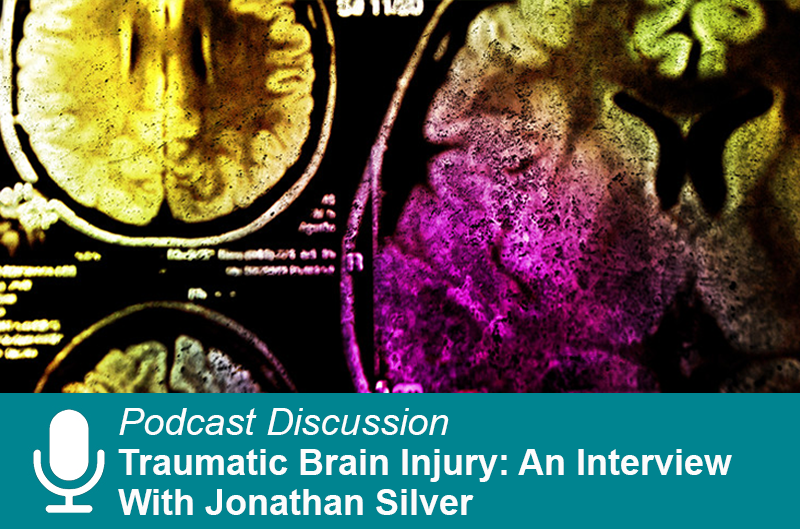Traumatic Brain Injury: An Interview with Jonathan Silver
, Volume , Number ,
https://www.thecarlatreport.com/#
Date Published: 8/17/2020 Duration: 15 minutes, 36 seconds Transcript: Welcome to the Carlat Psychiatry Podcast, keeping psychiatry honest since 2003. I’m Chris Aiken, the editor in chief of The Carlat Psychiatry Report. And I’m Kellie Newsome, a psychiatric NP and a dedicated reader of every issue. A traumatic brain injury, or TBI, is not the same as a head injury. We’re talking here about an injury to the brain, not the face or the ears. And we’re talking about a traumatic injury, not a stroke or tumor. The brain is protected by a hard skull, but there’s little to protect it within the skull, and much of the trauma in TBI comes from the sudden movement of the brain within the skull. Additional or “secondary” injuries that can happen after the trauma through changes in cerebral blood flow or intracranial pressure. The resulting structural damage is not always detectable on CT and MRI. Opening the skull to relieve pressure was one of the first treatments for traumatic brain injury in the 19th century. And going back further, it was probably because of brain injury that ancient Greek physicians like Hippocrates understood the brain to be the center of thought. Common causes of TBI are falls, motor vehicle accidents, and violence. While older adults are more prone to falls, TBI is most common in children and young adults. Look for it in patients with PTSD – there’s increasing awareness that victims of domestic violence and child abuse have higher rates of TBI Last year researchers at Ohio State University looked at rates of head injury – not brain but head – in women who had sought help for domestic violence. 81% had suffered blows to the head and 83% had been strangled. Not all head injuries are brain injuries, and not all strangulations cause enough hypoxia to damage brain tissue, but it’s important not to miss these cases whose problems with memory, mood and irritability might otherwise by ascribed to PTSD. Another population to look out for is the homeless – a 2019 study found that half of homeless people have suffered a TBI. In this month’s report we featured an interview with Jonathan Silver on TBI, and today we’ll share a few highlights and rare outtakes from that conversation: Thank you Dr. Silver. Jonathan Silver is a Clinical Professor of Psychiatry at New York University School of Medicine and Co-editor of the Textbook of Traumatic Brain Injury which is in its third edition from APA press. Check out the full interview online, which includes tips on lifestyle approaches to TBI, and how to address depression, irritability, and memory as well as medication side effects in this population. And as usual we have a handy table – this one with 8 medications for cognitive symptoms in TBI and how to dose them. And now for the word of the day…. Neuroprotection A lot of things can injure the brain – ischemia, toxic chemicals, seizures, infection, and blunt force. Neuroprotective agents are those that preservation neuronal structure and function in the face of these neurotoxic injuries. There are many ways they can achieve this effect – Raising growth factors like brain-derived neurotrophic factor (BDNF) or neuroprotective factors like Bcl-2; or reducing inflammation or toxic compounds like glutamate, or preventing cell death. Most psychiatric medications and many vitamins and supplements we use in psychiatry are neuroprotective. Some, like atypical antipsychotics, have neuroprotective and neurotoxic effects, while others like the stimulants and benzos don’t offer any real protection and can be neurotoxic in high dose. Among psych meds lithium has the strongest neuroprotective properties, which occur through multiple mechanisms throughout the brain, while antidepressants offer more limited neuroprotection in the area of the hippocampus and amygdale. Still, that’s enough that outcomes are better when someone has a stroke while taking an SSRI vs. not, independent of whether they develop depression. What do lithium’s neuroprotective mechanisms mean? They may explain why lithium prevents dementia as well as mood relapses, but what about TBI? We don’t know. Many neuroprotective agents have been tested in TBI, and so far they tend to work in animal studies but don’t pan out in humans. Dr. Silver speculated on why that is. Dr. Silver speculated that this may have to do with the timing – that they may need to be given immediately after or even just before the injury. Lithium has not been tested in control studies of humans with TBI, but in animal studies it reduces neuronal death, amyloid and tau build-up, and preserves the integrity of the blood-brain barrier integrity. Think twice before you jump in with lithium in TBI however. These patients are more sensitive to neurologic side effects on lithium, like tremor and cognitive problems. On the other hand, TBI is itself a risk factor for dementia, and very low doses of lithium – like 300 micrograms i.e. 0.3 mg to 150 mg a day–prevent dementia, so we’d like to see a study of microdose lithium in TBI. Got feedback? Take the podcast survey.
Traumatic Brain Injury (TBI) causes a host of psychiatric symptoms, and they don’t always respond to medications the way that other diagnoses do. In this interview, Jonathan Silver shares his top treatment tips on TBI. Dr. Silver is the co-editor of the APA’s the Textbook of Traumatic Brain Injury.




Leave A Comment
You must be logged in to post a comment.